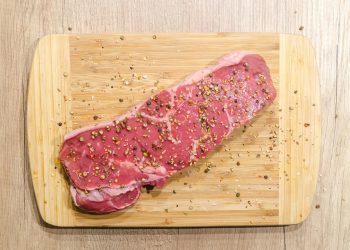Nebraska is set to take a significant stand against cultivated meat with the recent executive order signed by Governor Jim Pillen. This directive, which is aimed at preventing the state’s departments and organizations with state contracts from purchasing cultivated meat alternatives, reflects the governor’s commitment to traditional agriculture and the livestock industry. The order prohibits state agencies from favoring cultivated meat over conventional animal-based products, reinforcing Nebraska’s long-standing relationship with the beef industry.
Looking Ahead to 2025: Proposed Ban on Commercial Distribution
Governor Pillen’s stance on synthetic meat doesn’t stop with the executive order. He has announced plans to propose a comprehensive bill in 2025 that would ban the commercial distribution of cultivated meats throughout the state. During a press briefing at a beef ranch in West Point, the governor emphasized Nebraska’s role as a leading voice in the fight against cultivated meat, positioning the state as a strong advocate for traditional meat production methods.

Defending the Beef Industry
Nebraska has long been known as a major player in the beef industry, and Governor Pillen’s actions reflect a defense of this agricultural cornerstone. Cultivated meat, which has been developed as an alternative to traditional animal farming, has sparked debate across the country due to concerns over sustainability, ethical considerations, and the impact on rural economies, In Nebraska, where cattle ranching is a key component of the state’s economy, the governor is determined to maintain the prominence of traditional livestock farming and ensure that it remains a critical part of the state’s identity.
Campaign Against Cultivated Meat
Governor Pillen’s directive is part of a broader campaign against synthetic meat, a movement that has been gaining traction in various agricultural states. The proposed legislation in 2025 would mark a significant moment in this campaign, potentially setting a precedent for other states that prioritize traditional meat industries over emerging food technologies. By taking a strong stance, Nebraska is positioning itself as a leader in the ongoing national conversation about the future of meat production and its impact on rural economies, agriculture, and consumer choice.
As the debate continues, this move is likely to garner both support and opposition, with advocates for lab-grown meat arguing for its potential to reduce environmental impact and promote animal welfare, while traditional meat producers see it as a threat to their livelihoods. Nebraska’s stance may influence how other states approach the growing trend of alternative meat products in the years to come.
A Pivotal Moment for the Future of Meat Production
Nebraska’s upcoming ban on lab-grown meat in 2025 could mark a turning point in the wider conversation about the future of meat production in the United States. As alternative proteins and lab-cultured meat gain momentum globally, Nebraska’s move sets a clear distinction between traditional agriculture and emerging food technologies. The state’s decision to limit the use of lab-grown meat may shape national discussions on regulation, consumer preferences, and the role of technology in food systems.
Governor Pillen’s proposal aligns with the interests of many rural communities and livestock producers who see cultivated meat as a potential disruption to their livelihoods. By emphasizing the importance of supporting local farmers and protecting the state’s agricultural heritage, Nebraska is positioning itself at the forefront of a movement that favors traditional meat industries over technological alternatives.
Impact on National and Global Markets
If passed in 2025, Nebraska’s ban on cultivated meat could influence other agriculture-heavy states to follow suit. States with strong beef, pork, and poultry industries may see this as an opportunity to safeguard their local economies and push back against the growing trend of synthetic meat production. In contrast, states with a focus on technology and sustainability may continue to embrace lab-grown meat as a solution to meet the growing demand for ethical and environmentally friendly food.
On a global scale, Nebraska’s actions could add fuel to the ongoing debate over food sustainability and innovation. As countries explore alternative protein sources to reduce carbon footprints and address global food security concerns, Nebraska’s ban may challenge the adoption of lab-grown meat technologies in regions where traditional meat production remains a vital economic force.

The Next Steps for Nebraska
As 2025 approaches, Governor Pillen’s administration will likely focus on rallying support for the proposed legislation within Nebraska’s legislature, while also preparing for potential legal challenges from advocates of lab-grown meat. Lobbying efforts from both sides of the debate are expected to intensify, with traditional meat producers backing the ban and supporters of food innovation pushing to keep cultivated meat in the marketplace.
At the heart of the issue is a fundamental question: What is the future of food production in a world that increasingly values both tradition and innovation? Nebraska’s stance on cultivated meat could play a significant role in answering this question and setting the course for how meat products are regulated, produced, and consumed in the years to come.
Conclusion
Nebraska’s bold move to ban cultivated meat signals a decisive moment in the battle between traditional farming practices and innovative food technologies, While the governor’s actions reflect the state’s deep commitment to its agricultural roots, the broader implications of this ban will ripple across the industry, influencing legislation, consumer behavior, and the future of sustainable food systems, As this debate unfolds, the eyes of the nation—and the world—will be on Nebraska to see how it navigates this complex and evolving food landscape.









